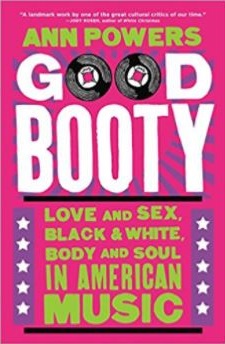Rock critic.
Would-be historian?

GOOD BOOTY is the book.
Is she trying to bring passion into history or just using sex to sell?
Years ago, Pat Benatar insisted, "Stop using sex as a weapon."
After reading GOOD BOOTY, we more than agree with Pat.
This is one of those bad books that tries to squeeze everything in and say everything needed but you can't cover the history of modern music in five hundred pages.
So you get a fleeting sentence here and there on this influential artist (Joni Mitchell, for instance) but nothing lasting, nothing unique and nothing original.
Powers spends a few pages on certain artists.
They'd be better off reduced to a single sentence in her rush-rush coverage.
That's especially true when she decides to 'explore' Jim Morrison.
'Explore'?
For writing this shallow, 'explore' is really a generous term.
Her 'analysis' of Jim was that he wanted to show his cock.
We're not kidding.
Now there's one concert where Jim may have pulled it out.
He wanted people to think he did -- but whether he actually did or not, that's in dispute.
Unless you are Ann Powers and writing about how Jim's desire to flash the cock is his entire modus operandi for his music, his performance, his entire existence.
Stop using sex, Ann Powers, as a weapon.
Especially when you write so poorly.
Here she is writing about a genuine rock god, The Lizard King, for goodness sake.
And it's so boring she puts you to sleep.
Does Ann know what a cock can do?
She knows exposing it can cause trouble, but does she know what a cock can actually do?
Her writing is asexual despite her constantly insisting everything is sex. Carly Simon's "Anticipation" is foreplay, Joni Mitchell's "You Turn Me On I'm A Radio" is a sensual song -- funny Joni always saw it as the song she wrote as a dare when David Geffen doubted she could write a hit single.
Diana Ross is mentioned briefly. Once as a Supreme. Later, Ann notes her early solo career in a sentence. But, strangely, for a book supposedly covering sex and race, she has nothing to say about Diana's hit "Muscles" or the beefcake video that came with the song.
She insists Michael Jackson was "soaked in sexual anxiety."
Strange that Ann Powers ignored "Muscles" since the song was written by Michael Jackson.
She types, "In his other great 1980s videos, for "Billie Jean," "Beat It," and "Bad," Jackson plays similar roles: whether noir gum-shoe or gangland street fighter, he is always a hero driven into action by baser desires."
Huh?
Has she ever seen the video for "Billie Jean"?
She writes like she has never seen the video.
What "baser desires" motivate him?
A fit bit to count his steps?
Many critics, including J. Randy Taraborreli, have lamented that "Billie Jean," which is so strong lyrically, has no visuals that live up to the song in the video.
Ann's confusing throughout.
For example, she can type "JIM MORRISON: LAMENT FOR THE DEATH OF MY COCK."
She just can't follow it up with anything that matters.
Nearly 500 pages of tease, tease, tease.
It all adds up to so damn little.
Good golly, what a folly.